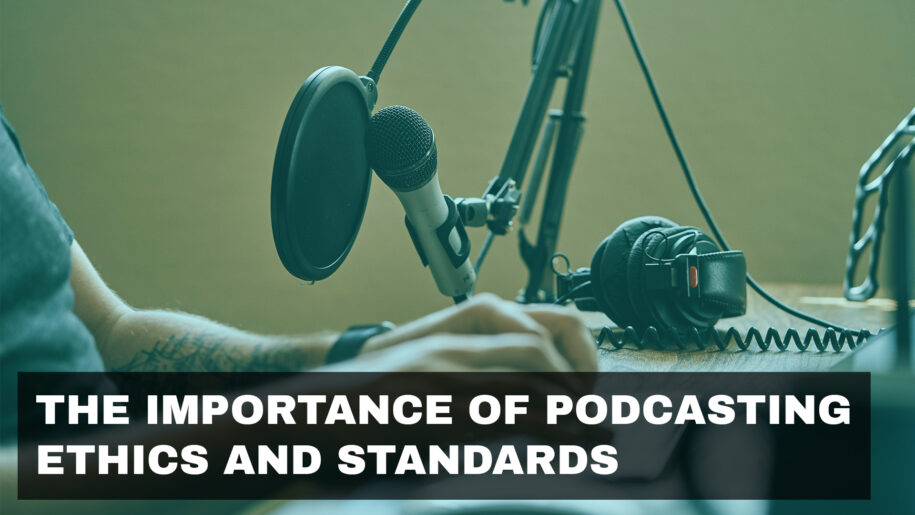Podcasting has become a powerful medium for sharing information, stories, and ideas. With its growing popularity, it is crucial for podcasters to uphold high ethical standards and adhere to established norms. Ethical podcasting not only builds trust with your audience but also enhances the credibility and longevity of your content. In this blog post, we’ll explore the importance of podcasting ethics and standards and how to implement them in your podcast.
1. Building Trust and Credibility
Trust is the foundation of any successful podcast. By maintaining high ethical standards, you show your audience that you are a reliable source of information. This trust can translate into a loyal listener base and positive word-of-mouth.
Example: “Podcasts that consistently provide accurate information and disclose potential biases are more likely to retain their listeners’ trust.”
2. Ensuring Accuracy and Fairness
Accuracy is vital in podcasting. Ensure that all facts and information presented in your episodes are well-researched and verified. Avoid spreading misinformation or unverified claims.
Example: “Always cross-check facts and cite credible sources. If you make a mistake, correct it promptly in a future episode.”
3. Respecting Privacy and Consent
Respecting the privacy and consent of your guests and listeners is paramount. Obtain explicit permission before sharing any personal information or recording conversations. Always inform guests about the recording process and how their contributions will be used.
Example: “Provide guests with a consent form that outlines how their interview will be used and shared.”
4. Avoiding Plagiarism
Originality is key in podcasting. Avoid using someone else’s content without proper attribution. Plagiarism not only damages your reputation but can also lead to legal consequences.
Example: “Always credit the original creators when referencing their work or ideas. Use quotes sparingly and provide context.”
5. Maintaining Transparency
Transparency involves being open about your intentions, affiliations, and any potential conflicts of interest. Clearly disclose any sponsorships, partnerships, or paid promotions in your episodes.
Example: “Include a brief disclaimer at the beginning of sponsored episodes to inform listeners about any affiliations or financial incentives.”
6. Encouraging Diversity and Inclusion
Promote diversity and inclusion in your podcast by featuring a wide range of voices and perspectives. This not only enriches your content but also fosters a more inclusive podcasting community.
Example: “Actively seek out guests from diverse backgrounds and create content that reflects various viewpoints and experiences.”
7. Being Responsible with Sensitive Topics
When discussing sensitive or controversial topics, approach them with care and sensitivity. Provide trigger warnings if necessary and handle such subjects with the appropriate level of respect and empathy.
Example: “Include a disclaimer at the beginning of episodes that cover sensitive topics, and provide resources for listeners who may be affected.”
8. Engaging with Your Audience Respectfully
Engage with your audience in a respectful and constructive manner. Encourage feedback and be open to criticism. Avoid engaging in online arguments or negative interactions that can harm your podcast’s reputation.
Example: “Respond to listener comments and emails thoughtfully, and consider their feedback when planning future episodes.”
Upholding ethics and standards in podcasting is essential for building a reputable and successful show. By ensuring accuracy, respecting privacy, avoiding plagiarism, and promoting transparency, you can create a trustworthy and credible podcast. Additionally, fostering diversity, handling sensitive topics responsibly, and engaging respectfully with your audience further strengthens your podcast’s impact and integrity.
Additional Tips
- Stay Informed: Keep up-to-date with podcasting guidelines and best practices from industry organizations.
- Regular Reviews: Periodically review your podcast’s content and practices to ensure they align with ethical standards.
- Continuous Learning: Attend workshops and webinars on podcasting ethics and standards to enhance your knowledge and skills.
By prioritizing podcasting ethics and standards, you’ll not only enhance your show’s credibility but also contribute positively to the podcasting community as a whole.


